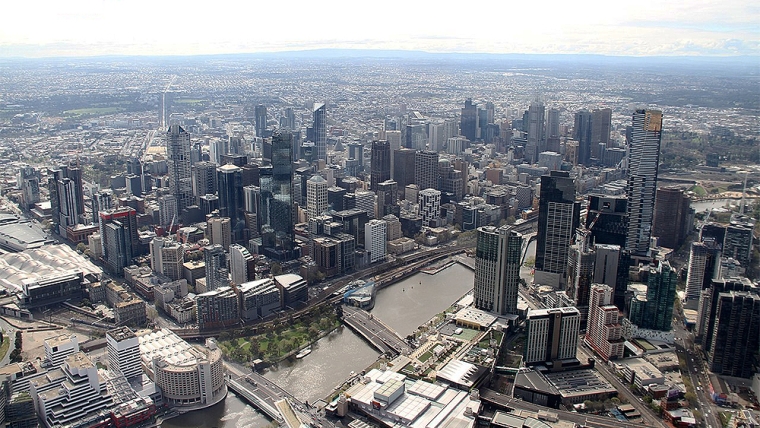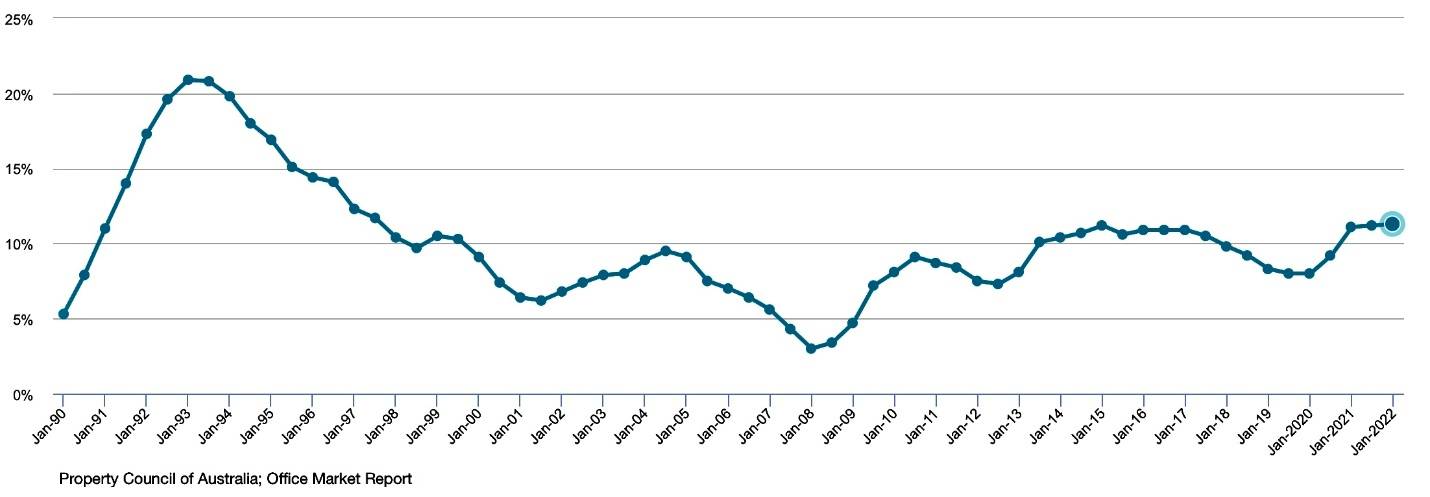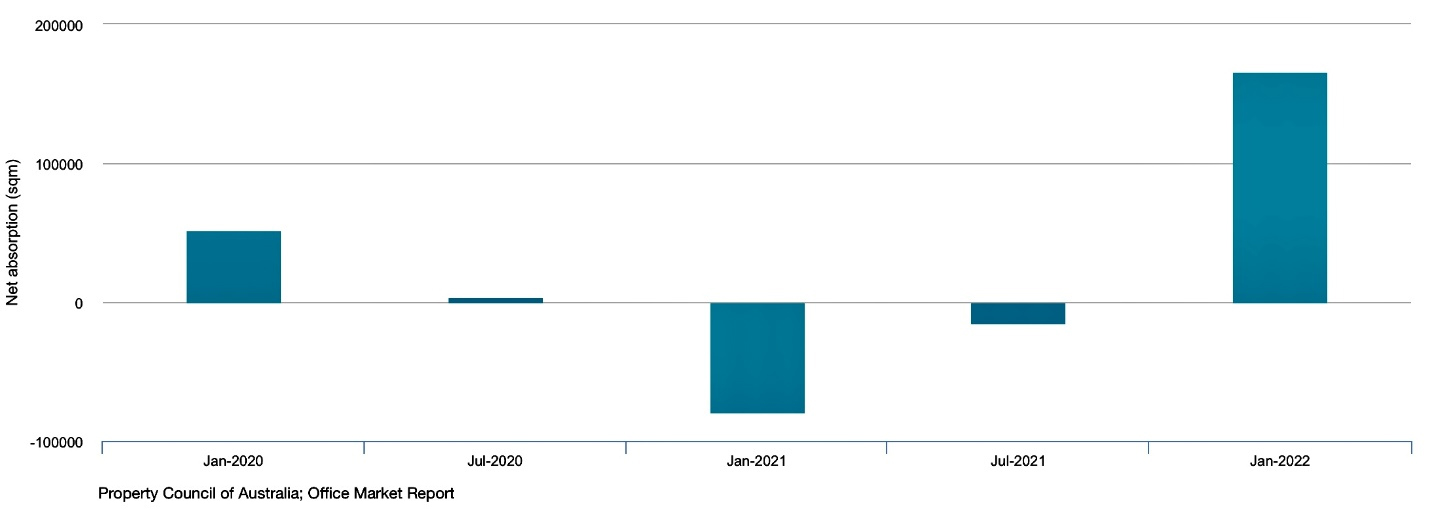
When Covid-19 first struck Australia two years ago, one of the most immediate and striking impacts was the near abandonment of the central business districts in the country’s major cities. Within a few short weeks what had been bustling centers of commercial and cultural life became wastelands.
For the white-collar workers who had previously filled the office towers in Sydney, Melbourne, and Brisbane, ‘working from home’ quickly became the new normal. The legions of CBD service workers, from hairdressers and cleaners to chefs and baristas, could not work from home, but there was now little for them to do in the deserted centers of the big cities.
There were dire predictions for the future of CBDs, indeed of inner-city areas generally. Everyone would move to the regions some said. We’re all ‘sea-changers’ or ‘tree-changers’ now many argued (often real estate agents).
There was evidence that the markets agreed with these pessimistic projections. The price of real estate investment trusts invested in the office sector fell and plans for some new office projects were shelved. However, it was often difficult to distinguish between general economic nervousness and specific concerns about CBD property.
Two years on, more hard data is available. In January, the Property Council of Australia released its latest Office Market Report. The following graph from that report shows the vacancy rate in Australian CBD office space over the last twelve years.
Total vacant Australian CBD office space expressed as a percentage of total stock

The vacancy rate certainly increased through 2020 but that increase was not as dramatic as some of the early pandemic doom saying might have suggested. The vacancy rate plateaued through 2021.
To paraphrase Mark Twain, reports of the death of the CBD have been greatly exaggerated.
Perhaps more significantly, the Property Council of Australia reports that demand for CBD office space is now rising. According to PCA chief executive Ken Morrison “the reality is that most CBD businesses continue to see the office as integral to their future, and that is reflected in the increased demand for office space over the past six months”.
This can be seen in the following graph recording the change in net demand during the pandemic. The turnaround from January 2021 to January 2022 is significant.
Australian CBD office market net demand (or net absorption), measuring the change in occupied space between two survey periods

Another sign of the resilience of the CBD market is a series of recent high value investments. Earlier this month, the Link REIT based in Hong Kong paid $1.1 billion for a half interest in a portfolio of five office blocks in Sydney and Melbourne.
Sale volumes were high in 2021 with many of the purchasers being offshore. According to the Australia & New Zealand Property Journal, “Sydney office sales grew 48% on 2020 volumes, with overseas investors accounting for around 60% of the total, their highest share in over a decade”.
Nevertheless, it would be foolish to suggest that the pandemic was just a temporary blip for Australian CBDs and that it is now a case of business as usual. Working from home (WFH) is not a passing phase. It may have exploded under Covid-19, but it will not die away again when the pandemic departs. It constitutes a revolution with inevitable consequences for the modern office.
Many white-collar workers in Australia are still working solely or primarily from home leaving acres of empty offices in law firms, accounting firms, and banks. A lot of those workers have come to love the flexibility and autonomy of working from home and they don’t miss the daily grind (and expense) of commuting to and from a central office. Many of them will never return to the office fulltime.
Different hybrid models are emerging in different sectors. For example, staff at the major accounting firms can now work part of the week from home and are even allowed to spend a certain number of weeks each year working remotely outside Australia. No doubt the shortage of skilled staff is a factor in these permissive policies.
All the hybrid models have one thing in common – less time spent by staff in CBD offices. It is difficult to imagine that this will not lead to more ‘hot desking’ and similar flexible use of floor space to achieve greater efficiency. And greater efficiency means smaller tenancies.
Take the case of international legal mega-firm Clifford Chance. It has told staff that in future they can work from home half the time and it has undertaken a comprehensive review of its leasing requirements at its Canary Wharf head office in London. Reports suggest that it may drop up to two thirds of its space.
It’s clearly too early to say that the threat to Australia’s CBDs is over. The worst of the Covid-19 pandemic appears to be behind us but there is ongoing uncertainty. Many current CBD tenants are no doubt awaiting greater clarity before they make any final decisions on their leasing requirements. We may yet see many organisations seek to sublease part of their premises.
State governments are alert to the risks here and are keen to re-energise CBDs. These areas play a vital role in state economic activity and are the location of huge public investment in infrastructure and cultural institutions. State governments cannot afford to see them stagnate.
As has been the case on many occasions during the pandemic, NSW is taking the lead. On 11 February, the NSW state government held a third ‘CBD summit’, this one entitled Kick-Starting Sydney: Recapturing the Energy of the Sydney CBD. Its objective was to “to drive business, employment and foot traffic in the city”. A week later, the NSW government ended its recommendation that people work from home.
Prominent Victorian business leaders and business lobby groups met with state officials last Friday to demand that the government do more to get workers back into the Melbourne CBD. They wanted an end to Victoria’s WFH recommendation and mask mandates.
The response was immediate. On Tuesday, the Victorian premier Dan Andrews announced that, from Friday, the WFH recommendation will end and masks will not be required for most indoor settings. This is a start. But Melbourne’s CBD has suffered more than any other in Australia due to the long lockdowns endured by the city. It will be some time before it returns to any kind of normality.
In the medium term, there is no doubt that Australian CBDs will survive and prosper. However, only the most vociferous spruiker of CBD real estate would argue that Covid-19 won’t have a permanent impact on the preferences of office workers and the places where they work. It may be years before that impact is clear.
Ross Stitt is a freelance writer and tax lawyer with a PhD in political science. He is a New Zealander based in Sydney. His articles are part of our 'Understanding Australia' series.
12 Comments
I cannot understand why WFH isn't seen as an opportunity to repurpose CBD office's into apartments increasing the vitality of CBD to the advantage of all .
yep, and then for those that own commercial real estate (they usually own more than one tower) it makes their holding more efficient and valuable...
until the demand for commercial swings back in that direction and up and then the builders have jobs to throw up some more commercial units
half of Aucklands CBD has already been repurposed, it is by far and away the most popular residential suburb in NZ.
Covid has brought step change to the big commercial CBD businesses. As the article ends - WFH will be a big part of our future, as now we've had a taste of it, it's starting to appear in employment contracts around the civilised world. Less commute, less pollution, more time with the family, more flexibility all round. Sounds life enhancing to me. But I'm biased. We've been WFH for 26 years.
Out of 50 employees at our company maybe 2 come into the one of two offices we have in CBD regularly and both of those are recent grads...
the housing issue has pushed people out to Huia, Hibiscus Coast, Warkworth and were coming in everyday... they'll come in for the Christmas Party now , thats about it.
Another has moved to Tauranga, Im working from Melbourne next week for 2 days to free up some leave requirement and with cheaper mid week flights for a visit to friends. We finish our least on two offices on K road next month.
In our UK office - recent Cambridge graduates who stayed in Cambridge after their study, got the job with the company and stayed local to travel to the offices (Nationals from Argentina, Germany, Spain off the top of my head) have moved home and they just align their meeting times. Its actually quite nice to get an out of the window view in all these different countries when you're working on the same thing). They say out of close to 80 about 4 go into the office regularly.
Its allowed the younger ones to move slightly further out of Cambs city reaches where property is crazy expensive to get their first home.
Just two examples where it seems that its not all that important to be in the same post code or even hemisphere to do certain tasks.
These employees sound like the ones a country needs for economic viability. Our govt should be thinking how to get them to NZ and then keep them here. Our weather is good, some of our environment still looks wonderful (which world city matches the range and quality of Auckland regional parks?). So let's get sensible house prices, improve schools & hospitals, generous child benefit, more work on the environment.
I think this piece underestimates the demand destruction. With multi-year commercial leases there's a huge lag. I suspect a lot of companies want to keep some fraction of their office space - so they'll keep paying for now but will negotiate for less floor space when it's time to renew.
Totally agree- the average lease is 6 years in Auckland with larger occupiers often committing to 9-12 year leases. Very few organisations have had a chance to ‘right size’ yet so the vacancy rates for offices are still relatively low even though the buildings are largely unoccupied.
Wild horses wouldn't drag me back in.
If they tried I think I'd test covid positive pretty quick...endlessly
Employees don't seem to see the problem with having work from home (WFH) long term.
Whilst celebratory at the beginning it may just end in otherwise.
If the job can be strictly executed from your home, it also means that it can be sub-contracted or off-shored. As WFH continues, companies may find that they actually have more employees than they need and that usually leads to downsizing employee numbers.
Companies should re-look at their current employee roles and re-evaluate what could be reduced, sub-contracted and off-shored.
It's time to make up for the loss in COVID.
Will be a hybrid model…….
We talked about that, even most employees would welcome some of the work going to a testing centre in india for example , but the idea was thrown out when it becomes attractive to the sub contractor to create work rather than value ...
Our business needs a lot of domain knowledge so its not a case of ticking boxes... however from top to bottom, no-one wants to work in the office daily.
We have offices in UK, Japan, USA, NZ, Germany,
All talk multiple times a week... at very strange times of the day... but everyone seems to be in their home office (especially at 9pm) - so whats the difference > 9pm or 11am... it can be done as long as you have an internet connection

We welcome your comments below. If you are not already registered, please register to comment
Remember we welcome robust, respectful and insightful debate. We don't welcome abusive or defamatory comments and will de-register those repeatedly making such comments. Our current comment policy is here.